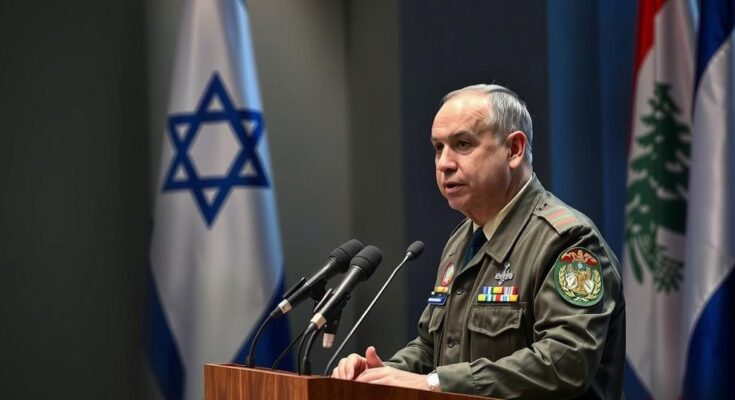Israel’s Defense Minister Israel Katz declared no ceasefire in Lebanon amidst escalating violence, contradicting earlier claims of progress by Foreign Minister Gideon Saar. The military campaign has resulted in over 3,000 deaths and widespread displacement in Lebanon. As regional leaders express concern over the crisis, humanitarian efforts face significant challenges.
Israel’s newly appointed Defense Minister, Israel Katz, emphatically stated that there will be no ceasefire or respite in Lebanon, amidst a backdrop of escalating confrontations and recent airstrikes by Israel. Katz asserted via social media that the campaign against Hezbollah would persist relentlessly until Israel’s objectives—disarming Hezbollah and ensuring their withdrawal beyond the Litani River—are fully realized. He emphasized that Israel would not entertain any arrangements that could compromise its right to self-defense against terrorism. This declaration came in stark contrast to Foreign Minister Gideon Saar’s earlier comments suggesting progress in ceasefire negotiations, although Hezbollah denied any involvement. The situation in Lebanon is dire, with an estimated 1.2 million individuals displaced due to the Israeli military operations, which have resulted in heavily reported casualties, including over 3,000 fatalities. In parallel, recent statements from regional leaders, including Lebanon’s caretaker Prime Minister Najib Mikati, highlight the unprecedented crisis threatening the country’s stability.
The crisis in the Middle East, particularly regarding Israel’s military operations against Hezbollah in Lebanon, has intensified in recent weeks, leading to significant civilian casualties and widespread displacement. The dynamics have changed quickly, especially following the recent appointment of Israel Katz as the defense minister, who has taken a hard-line stance against ceasefire negotiations. The ongoing military actions are marked by escalating tensions and a humanitarian emergency, further complicated by geopolitical interplays involving neighboring countries and international perspectives, particularly regarding humanitarian aid and ceasefire efforts. The death toll in both Lebanon and Gaza continues to rise dramatically, provoking international concern.
In summary, the situation in Lebanon remains critical, with Israel’s defense minister firmly rejecting ceasefire talks, opting instead for relentless military action against Hezbollah. This stance exacerbates the humanitarian crisis, as millions are displaced and thousands have lost their lives. The differing statements from Israeli officials on ceasefire negotiations indicate a dissonance in the Israeli government’s approach to addressing the ongoing conflict. This complex interplay of military and diplomatic efforts will significantly shape the future of peace in the region.
Original Source: www.theguardian.com




